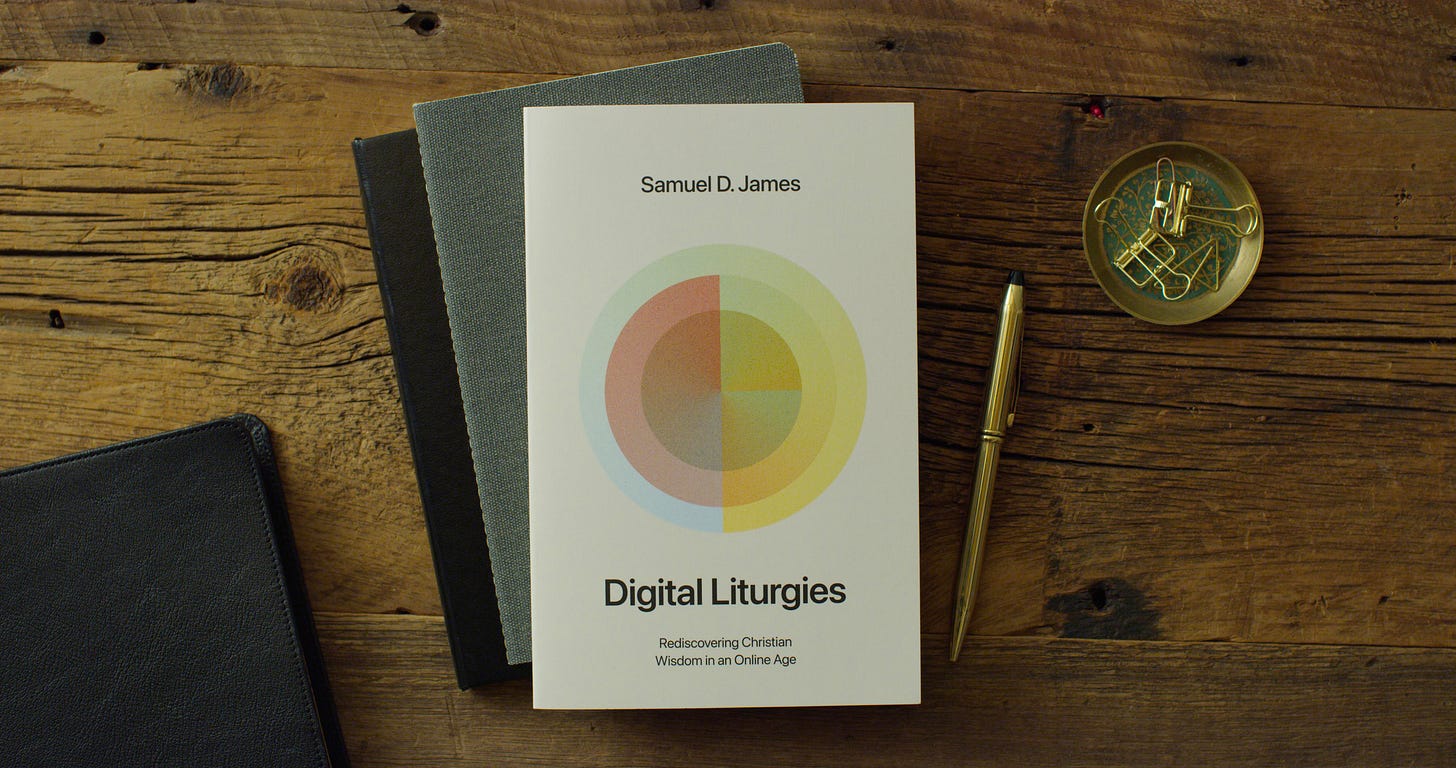My 15 Favorite Quotes From Digital Liturgies
I recently had the joy of chatting about Digital Liturgies with Samuel D. James on my podcast. I asked him to describe what the book is all about in a single sentence. He said,
This book is about how Internet technology shapes us, heart and soul.
It’s an amazing book. It’s one of the best technology books written in the last ten years. It’s wise, biblical, nuanced, and will help you worship God.
You can win a free copy (thanks to Crossway) by entering our podcast’s draw on Twitter, Instagram, or by listening to the episode and following the instructions at the end. Less than 5 people have entered so far… so there’s a good chance you’ll win a copy. Winner will be selected Sept. 20th at 10pm EST.
Here’s a link to our conversation. And here are my fifteen favorite quotes.
1
As much as we might tell ourselves we go to the internet and social media to be plugged into what's going on in the world, many times we're logging on to escape it.
2
Social media’s algorithmic design to elicit our anger so as to
command our attention is nothing less than a moral crisis.
3
Moral relativism is dead, and the hashtag helped kill it.
4
Pixels are not created in God's image. People are. It is a holy thing to be with
another human being. It is, in fact, our eternal destiny.
5
The internet is an epistemological habitat that makes genuine wisdom difficult and unappealing. The web makes it easy and rewarding to engage in knee-jerk judgments, emotivism, and fallacies. Further, this is not an accident. The social internet is designed for one purpose: to keep us scrolling, keep us posting, and keep us hooked.
6
Pornography's function as a way to turn the transcendent into the consumable has become so embedded into our online lives that it is now literally what we can call any of the content we consume. It's almost as if, in at least a real sense, everything on the internet is a kind of porn.
7
Rather than being a neutral tool, the internet (particularly the social internet) is an epistemological environment — a spiritual and intellectual habitat — that creates in its members particular ways of thinking, feeling, and believing.
8
Again, I should make clear what I am not saying. I'm not saying that everything on the web is pornographic, nor am I saying that everyone who spends a significant amount of time online is secretly looking at pornography or will soon. To say that the web is pornographically shaped is not to say that it is inherently explicit or sinful. Rather, the point is that the digital liturgies of endless novelty, constant consumption, and limitless power make pornography more plausible to our hearts and our habits.
9
…one of the most important things Christians can do in the public square is to live and talk and post in such a way that demonstrates a calm confidence in the sovereignty of Jesus.
10
…a commitment to Christian thinking is not a total rejection of having a “tribe”.
It is, however, a rejection of tribe worship.
11
Glory from others is a powerful reality distorter, and in the age of social media,
it is one of the most profound threats to truthful Christian thinking.
11
Church is gospel givenness.
13
Our digital technology has imported its values of immediacy and fleetingness into our souls. This results in more amazing products and greater feelings of efficiency and control over our world but at the high cost of a suffocating sense of anxiety. The age of connection is the age of loneliness. The age of productivity is the age of burnout. Why? Because we are not at peace.
14
There is an objectiveness to reality to which we as human creatures must conform if we are to live whole and well. The Bible calls our response to this objective reality "wisdom."
15
Wisdom has three essential levels: the skill of living (practical), becoming a good person (ethical), and fearing God (theological). All three ways of living are wise not only because they are commanded by an authoritative Creator; they are wise because they are responsive to objective realities in the world.
Two more of my favourite quotes in the book were actually how Samuel James quoted John Piper and C.S. Lewis. But you’ll have to buy the book to get the full impact of those.



